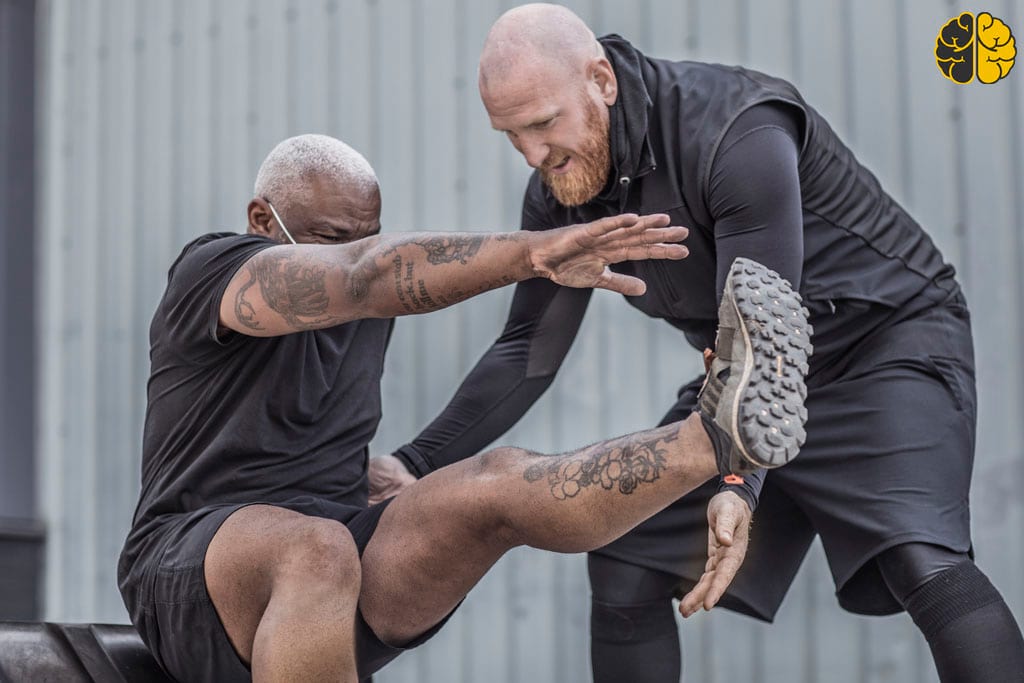What are the best certifications for personal trainers?
The answer is important for gym owners because the numbers don’t lie: Fitness businesses with personal-training programs can earn more. Data from Two-Brain’s State of the Industry ebook showed that personal training generates 24 percent of revenue on average in gyms that offer the service. The number can be as high as 57 percent of revenue in some gyms.
In order to build a profitable personal-training program, gym owners need qualified, credentialed coaches who can succeed in one-on-one or small-group sessions.
For trainers, earning a credential can increase knowledge and coaching skill, but it also provides legitimacy in the eyes of the public and allows access to insurance coverage. These benefits are balanced by the initial cost of obtaining the credential, maintenance costs, and renewal and continuing-education requirements.
Below, we’ve rounded up six of the best certifications for personal trainers and collected everything gym owners and coaches need to know about each one.
Resource: Indeed.com Personal Trainer Salary
Resource: Create a Personal Trainer Business Plan
The Top 6 Credentials for Personal Trainers
American Council on Exercise (ACE)
The American Council on Exercise (ACE) is the world’s largest exercise-professional and health-coach certification organization. Its certifications are accredited by the National Commission for Certifying Agencies (NCCA), widely accepted as the gold standard for accreditation in the health and fitness professions.
The ACE Personal Trainer Certification is one of four professional fitness certifications the organization offers and is “designed for health and exercise professionals providing one-on-one or small-group fitness instruction to individuals who are apparently healthy or have medical clearance to exercise.”
To become an ACE Certified Personal Trainer (ACE-CPT), individuals must pass the ACE Personal Trainer Certification Exam, which covers material across four domains: interviews and assessments; program design and implementation; program modification and progression; and professional conduct, safety and risk management.
Once certified, ACE personal trainers benefit from a variety of career resources provided by the organization, including profiles in the United States Registry of Exercise Professionals and the national “Find Your Trainer” database, discounted liability insurance and educational programs, and more.
More information: ACE Personal Trainer Certification
Cost: US$849-$1,499 depending on package, with seasonal sales.
What you get: All three packages (Basic, Plus and Advantage) include access to ACE University (a digital learning platform featuring course tracking, video demonstrations, quizzes and a practice test), digital copies of the “ACE Personal Trainer Textbook” and “ACE Personal Trainer Study Companion,” and access to ACE Answers (an on-demand study support program featuring answers to common study questions, exam preparation articles and digital study groups).
Plus and Advantage packages also include hard copies of the textbook (the Advantage package includes an audiobook) and study companion, as well as a supplemental course (Exercise Science 101) and extra ACE Answers features including live Q&A webinars.
Features exclusive to the Advantage package include Ace Answers facilitated study groups and access to one-on-one support from an ACE Advantage representative.
Currently, all three packages include the option to take the exam from home with live remote proctoring.
Prerequisites:
- Must be at least 18 years old at time of registration.
- Must hold an adult CPR and AED certificate with live skills check. Online CPR/AED courses not accepted. (AED only required in U.S. and Canada.)
- Must present a current government-issued photo ID with signature (driver’s license, passport, military ID).
- Must have completed high school (or the equivalent).
Expiration:
- Valid for two years.
Renewal requirements:
- 20 hours of ACE-approved continuing education.
- Current CPR/AED certificate.
- Fee: $129.
What Two-Brain clients are saying about it:
“It’s a good intro to how to be a coach, and they have ample opportunities for continuing ed.”

Athletics and Fitness Association of America (AFAA)
The Athletics and Fitness Association of America (AFAA) has been certifying group and personal trainers for over 35 years. Formerly known as the Aerobics and Fitness Association of America, the organization was acquired by the National Academy of Sports Medicine (NASM, see below) in 2015.
The Personal Fitness Trainer Certification is one of six certifications the AFAA offers, although its Group Fitness Instructor Certification is its most robust and comprehensive. And while the latter is NCCA-accredited, the AFAA lists no accreditation for the Personal Fitness Trainer Certification.
To become certified, individuals must pass an exam covering the human body and exercise physiology; behavior modification and communication skills; fitness screening, health assessment and injury prevention; and the basics of nutrition and weight management.
More information: AFAA Personal Trainer Certification
Cost: $499
What you get: The cost of the exam includes access to 14 video lectures, a digital study guide, sample multiple-choice questions and a free digital subscription to “American Fitness Magazine.”
Prerequisites:
- CPR and AED certification.
- Valid photo ID.
Expiration
- Valid for two years.
Renewal requirements:
- 15 hours of AFAA-approved continuing education.
- Current CPR/AED certificate.
- Fee: $99 or $399 to recertify for life.
American College of Sports Medicine (ACSM)
The American College of Sports Medicine (ACSM) is a nonprofit sports-medicine and exercise-science membership organization providing NCCA-accredited certifications, networking opportunities and continuing education.
ACSM offers three “health fitness” certifications in addition to clinical certification and specialty certifications. Its personal trainer certification grants the certificant “the practical and scientific knowledge to work in a variety of fitness facilities, including health clubs; gyms; university, corporate and community or public fitness centers; and positions ranging from freelance personal training to full time and beyond.”
To become an ACSM Certified Personal Trainer (ACSM-CPT), individuals must pass an exam covering four domains: initial client consultation and assessment, exercise programming and implementation, exercise leadership and client education, and legal and professional responsibilities.
More information: ACSM Personal Trainer Certification
Cost: $279 (members), $349 (non-members).
What you get: Study resources are not included in the price of the exam, except for a free digital outline of the exam content.
Registrants have the option to purchase additional study materials, including textbooks, access to PrepU (a digital practice quiz platform) and various workshops and webinars.
Prerequisites:
- Must be at least 18 years old at time of registration.
- Adult CPR and AED certificate.
- Valid photo ID and secondary ID with signature.
- Must have completed high school (or the equivalent).
Expiration
- Valid for three years.
Renewal requirements:
- 45 ACSM-approved continuing-education credits.
- Current CPR/AED certificate.
- Fee: $45.
Or:
- Retake exam.

International Sports Science Association (ISSA)
Founded in 1988, the International Sports Science Association (ISSA) offers 12 fitness certifications and has certified over 300,000 trainers in 143 countries.
Its personal training certification is accredited by the National Council for Certified Personal Trainers (NCCPT) and qualifies certificants to provide clients with “customized training programs based on their individual health and fitness goals.”
To earn the ISSA Personal Training Certificate, individuals must pass an exam encompassing basic and applied sciences; client assessment; special populations; program design; nutrition; and professional practice, drawing-in phase, and fiscal fitness.
More information: ISSA Personal Trainer Certification
Cost: $133.17 per month for 12 months, with seasonal sales.
What you get: The cost of the ISSA Personal Trainer Certification includes access to several additional resources, including “Fitness—The Complete Guide,” a 759-page ebook covering the exam material.
It also includes access to online practice exams and quizzes, audio and video lectures, and an online student forum. Upon successful completion of the exam, certificants receive a customizable website and ongoing support from ISSA staff.
Prerequisites:
- Must be at least 18 years old at time of registration.
- Adult CPR and AED certificate.
- Current government-issued photo ID with signature (driver’s license, passport, military ID).
- Must have completed high school (or the equivalent).
Expiration
- Valid for two years.
Renewal requirements:
- Current CPR/AED certificate.
- 20 continuing-education hours.
- Fee: $0 if all 20 CEU credits are obtained through ISSA, $99 if CEU credits were earned outside ISSA.
National Academy of Sports Medicine (NASM)
Over its 30 years, the National Academy of Sports Medicine (NASM) has educated more than 1.3 million fitness professionals in more than 80 countries around the world.
It offers NCCA-accredited certifications in personal training, group fitness, nutrition and injury prevention in addition to several specialty courses.
Candidates who pass the NASM Personal Trainer Exam are allowed to include the certification credential “NASM-CPT” behind their names and use the title “NASM Certified Personal Trainer.” The exam covers six domains: basic and applied science and nutritional concepts, assessment, program design, exercise technique and training instruction, client relations and behavioral coaching, and professional development and responsibility.
More information: NASM Personal Trainer Certification
Cost: $799-$2,199, depending on package, with seasonal sales.
What you get: Registrants can choose from four packages: Self-Study, Premium Self-Study, Guided Study and All-Inclusive.
All four packages include access to the NASM-CPT digital textbook, content learning videos, the exercise video library, and practice exams and quizzes.
Premium Self-Study, Guided Study and All-Inclusive packages include exercise-coaching demonstrations, guarantee of a job within 90 days of successful exam completion, and a year’s access to NASM Edge, a personal-training mobile app.
On top of those resources, the Guided Study and All-Inclusive packages include the option to participate in a 10-week course led by an NASM fitness expert, an exam retest, a hard copy of the NASM-CPT textbook, access to an NASM mentor and access to bonus materials.
The All-Inclusive package features all of the above in addition to exam prep through NASM Edge, 80 hours of internship experience and recertification for life.
Prerequisites:
- Adult CPR and AED certificate.
- Current government-issued photo ID with signature (driver’s license, passport, military ID).
- Must have completed high school (or the equivalent).
Expiration
- Valid for two years.
Renewal requirements:
- 2 NASM-approved continuing-education units (equivalent to 20 contact hours).
- Current CPR/AED certificate.
- Fee: $99, or recertify for life for $399.

National Strength and Conditioning Association (NSCA)
The National Strength and Conditioning Association (NSCA) is a 43-year-old “nonprofit association dedicated to advancing the strength and conditioning and related sport science professions around the world.” It serves a network of more than 45,000 fitness professionals.
It offers three certifications accredited by the Council on Accreditation of Strength and Conditioning Education (CASCE), including personal training. The NSCA describes its personal-training certification as the ideal credential for those wishing to work with the general population to train clients of all ages who seek “to improve their personal health and fitness goals.”
Certificants must pass the NSCA-CPT exam, which covers four domains: client consultation/fitness assessment, program planning, exercise techniques, and safety/emergency issues.
More information: NSCA Personal Trainer Certification
Cost: $300 (members), $435 (non-members).
What you get: Study resources are not included in the price of the exam, except for a free digital outline of the exam content and sample questions included in the certification handbook.
However, registrants can choose from three study-package options for purchase: NSCA-Essential Package ($240.30 member/$290.70 non-member), NSCA-CPT-Essential Plus Package ($455/$511) and NSCA-CPT Digital Package ($152/$202).
The Essential and Essential Plus packages include copies of “Essentials of Personal Training” and the NSCA-CPT Study Guide, in addition to more than 200 practice questions. The Plus package also includes a copy of “Exercise Technique Manual” and additional unnamed resources.
The Digital package includes just the NSCA-CPT study guide and practice questions.
Prerequisites:
- Must be at least 18 years old at time of registration.
- Adult CPR and AED certificate.
- Current government-issued photo ID with signature (driver’s license, passport, military ID).
- Must have completed high school (or the equivalent).
Expiration
- Valid for three years.
Renewal requirements:
- Current CPR/AED certificate.
- Completion of required continuing-education units and fees. Details for 2021 pending. Click here to view 2020 recertification requirements.
What Two-Brain clients are saying about it:
“I feel that the NSCA definitely gives a candidate an advantage.”
Best Certifications for Personal Trainers: Comparison Table
| ACE | AFAA | ACSM | ISSA | NASM | NSCA | |
| Cost | US$849 -$1,499 | $499 | $279 or $349 | $133.17 per month | $799 -$2,199 | $300 or $435 |
| Education Prerequisites | High School | None | High School | High School | High School | High School |
| Expiration | 2 Years | 2 Years | 3 Years | 2 Years | 2 Years | 3 Years |
| Renewal Fee | $129 | $99 or $399 | $45 | $0 or $99 | $99 or $399 | Variable |
| CECs | 20 Hours | 15 Hours | 45 Hours | 20 Hours | 2 Units (20 Hours) | Variable |
Gym Owners Sound Off on PT Credentials
89 percent of respondents in a poll in Two-Brain’s private Facebook group for gym owners listed the NSCA credential as the one they regarded most highly of the six credentials profiled here.
The NASM credential was listed as best regarded by 11 percent of respondents.
The other four credentials—ACE, AFAA, ACSM and ISSA—did not receive any votes.

The Best Certifications for Personal Trainers: The Missing Element
Credentials look good on resumes and can inspire confidence in clients. And some provide better education than others. But it’s important to remember that even the best certifications for personal trainers are just pieces of paper.
“Credentials don’t tell me anything about how good you actually are at delivering results,” said one Two-Brain Business gym owner.
Happy, fit, healthy clients are ultimately the best proof of coaching skill.
And in the end, some prospective employers might not care exactly which credential trainers choose—especially if they’re passionate, personable people who make clients smile while they squat.
“I’m happy to see any sort of credential on a resume,” said another Two-Brain gym owner. “To me, what that says is the applicant is … invested in the craft of coaching and at a basic level understands the value of education and training.”
Trainers need some sort of credential, but they definitely don’t need all of them. A basic foundation of knowledge is important. But once it’s in place, there’s really no substitute for experience with actual clients and the mentorship of a great coach or gym owner who can help trainers grow their practices and serve clients better.
For a host of free resources—including an ebook on generating more personal-training revenue—click here.

